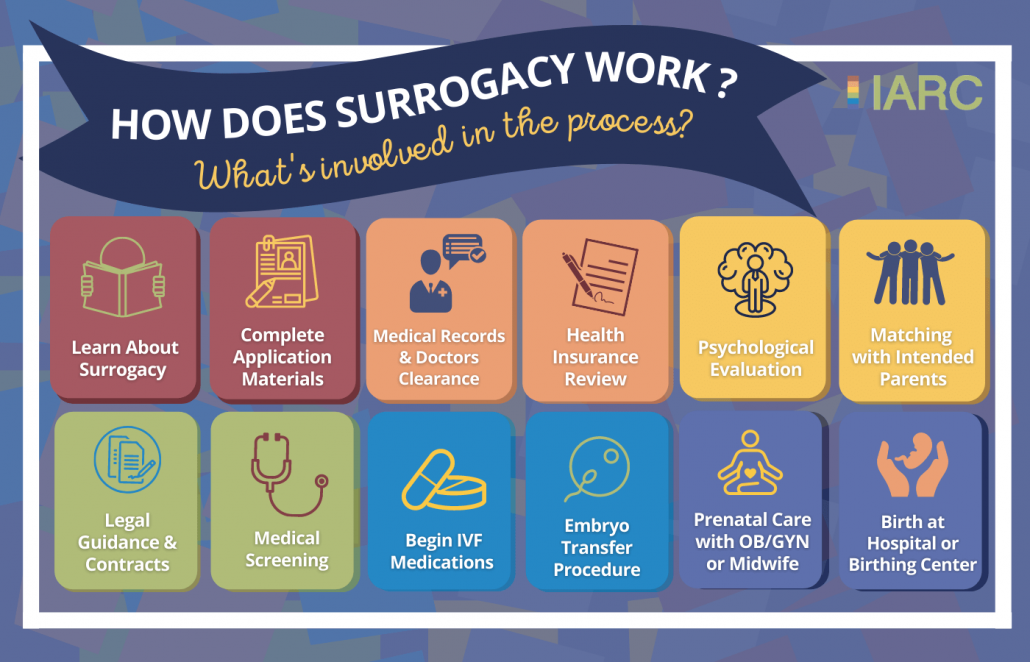How to get a child through surrogacy
What Is a Surrogate Mother? Process, Types, Cost, More
What do Kim Kardashian, Sarah Jessica Parker, Neil Patrick Harris, and Jimmy Fallon have in common? They’re all famous — that’s true. But they’ve also all used gestational surrogates to grow their families.
As these celebrities know, there are many ways to have children these days. And as technology advances, so do the options. More and more people are turning to surrogacy.
While you may associate this practice with movie stars and the rich, here’s what you can expect — from the general process to the overall costs — if you think this route may be a good match for your family.
First comes love, then comes marriage, then comes baby in a baby carriage. The old song sure leaves a lot out, doesn’t it?
Well, surrogacy can help fill in some of those details for the 12 to 15 percent of couples experiencing infertility issues — as well as for others who want to have biological children and are in other situations.
There are many reasons people choose surrogacy:
- Health issues prevent a woman from getting pregnant or carrying a pregnancy to term.
- Infertility issues prevent couples from either getting or staying pregnant, like recurrent miscarriages.
- Same-sex couples wish to have children. This may be two men, but women also find this option attractive because the egg and resulting embryo from one partner can be transferred and carried by the other partner.
- Single people want to have biological children.
Related: Everything you need to know about infertility
The term “surrogacy” is generally used to describe a couple different scenarios.
- A gestational carrier carries a pregnancy for an individual or couple using an egg that is not the carrier’s. The egg may come from either the intended mother or a donor. Likewise, sperm may come from the intended father or a donor. Pregnancy is achieved through in vitro fertilization (IVF).

- A traditional surrogate both donates her own egg and carries a pregnancy for an individual or couple. The pregnancy is usually achieved through intrauterine insemination (IUI) with sperm from the intended father. Donor sperm may also be used.
According to the Southern Surrogacy agency, gestational carriers are now more common than traditional surrogates. Why is this? Since a traditional surrogate donates her own egg, she is technically also the biological mother of the child.
While this can definitely work out just fine, it can create complex legal and emotional issues. In fact, several states actually have laws against traditional surrogacy for these reasons.
Some people find a friend or family member who’s willing to serve as a surrogate. Others turn to surrogacy agencies — in the United States or abroad — to find a good match. Agencies first screen candidates to ensure they meet the criteria associated with the process. Then they cross-match your own wants/needs to find the best situation for your family.
Don’t know where to start? Nonprofit group Society for Ethics in Egg Donation and Surrogacy (SEEDS) was created to review and maintain ethical issues surrounding egg donation and surrogacy. The group maintains a member directory that may help you find agencies in your area.
The qualifications for being a gestational surrogate vary by agency, but they involve things like:
- Age. Candidates must be between the ages of 21 and 45 years old. Again, the specific range varies by location.
- Reproductive background. They also have to have carried at least one pregnancy — without complications — to term but have fewer than five vaginal deliveries and two cesarean sections.
- Lifestyle. Surrogates must live in a supportive home environment, as confirmed by a home study. Drug and alcohol abuse are other considerations.
- Tests. Additionally, potential surrogates must have a mental health screening, a complete physical — including screening for sexually transmitted infections (STIs).

Intended parents have certain requirements to meet as well. These involve:
- providing complete health histories
- having physical exams to ensure they can successfully go through in vitro fertilization retrieval cycles
- screening for infectious disease
- testing for certain genetic diseases that could be passed to a child
Mental health counseling is also recommended to cover things like expectations from surrogacy, addiction, abuse, and other psychological issues.
Related: The 30-day guide to IVF success
Once you’ve found a surrogate, achieving pregnancy differs depending on what type of surrogate you use.
With gestational carriers, the process looks something like this:
- Choose a surrogate, usually through an agency.
- Create a legal contract and have it reviewed.
- Go through the egg retrieval process (if using intended mother’s eggs) or obtain donor eggs. Create embryos using intended father’s sperm or donor sperm.

- Transfer embryos to the gestational carrier (surrogate) and then — if it sticks — follow the pregnancy. If it doesn’t work out, the intended parents and surrogate may pursue another IVF cycle.
- The child is born, at which time the intended parents obtain full legal custody as outlined in the legal contract.
Traditional surrogates, on the other hand, are also donating their eggs, so IVF is usually not involved in the process.
- Choose a surrogate.
- Create a legal contract and have it reviewed.
- Go through the IUI process using the intended father’s sperm or donor sperm.
- Follow the pregnancy or — if the first cycle doesn’t work out — try again.
- The child is born. The surrogate may need to legally terminate parental rights to the child, and the intended parents may need to complete a stepparent adoption in addition to any legal contract set up in earlier stages of the process.
Of course, this process may be slightly different depending on the state in which you live.
The costs associated with surrogacy depending on the type and where you live. In general, the costs for a gestational carrier may fall somewhere between $90,000 and $130,000 when you take into account the compensation, health care costs, legal fees and other situations that may arise.
The West Coast Surrogacy Agency, based throughout California, lists its costs in detail on its website and explains that these fees can change without notice.
Overall compensation
Base pay is $50,000 for new surrogates and $60,000 for experienced surrogates. There may be additional fees as well. For example:
- $5,000 if the pregnancy results in twins
- $10,000 for triplets
- $3,000 for a cesarean delivery
You may also incur costs (that vary) for things like:
- monthly allowances
- lost wages
- health insurance
Costs may also include special circumstances, such as canceled IVF cycles, dilation and curettage, ectopic pregnancy, fetal reduction, and other unexpected situations.
Screenings
Expectant parents will also pay around $1,000 for mental health screenings for themselves, the surrogate, and the surrogate’s partner. Criminal background checks for both parties cost between $100 and $400. Medical screenings will depend on recommendations by the IVF clinic.
Legal costs
There are actually quite a few legal fees involved, from drafting and reviewing a surrogacy contract ($2,500 and $1,000, respectively) to establishing parentage ($4,000 to $7,000) to trust account management ($1,250). The general total here is somewhere between $8,750 to $11,750.
Other costs
This varies by clinic and agency. As an example, West Coast Surrogacy recommends psychological counseling to its intended parents and surrogates at 90 minutes a month and after different milestones, like embryo transfers. In total, these sessions may cost $2,500 — however, this support may or may not be recommended by other agencies.
Other possible costs include the surrogate’s health insurance ($25,000), life insurance ($500), and hotel stays/travel fees associated with IVF cycles ($1,500). Parents may also arrange for private health insurance verification ($275).
Parents may also arrange for private health insurance verification ($275).
Again, there are other miscellaneous situations, like IVF medications and monitoring or lost wages due to pregnancy complications, that may vary in cost.
What about traditional surrogates?
Your costs may be lower with traditional surrogacy because there’s no IVF involved. The cost of IUI is less and tends to have fewer associated medical procedures.
Does health insurance cover any costs?
Likely not, but it’s complicated. According to the ConceiveAbilities agency, around 30 percent of health insurance plans include verbiage that specifically states it will not cover costs for a woman for surrogacy. Around 5 percent do provide coverage, but the other 65 percent are a bit shady on the matter.
In short: There are many appointments, procedures, and then the birth itself to think about. You don’t want an unexpected and costly health insurance bill.
Most agencies will help you review the surrogate’s health insurance plan to determine coverage. They may also recommend that you purchase outside insurance for the surrogate using comprehensive surrogacy insurance programs through agencies like New Life or ART Risk Solutions.
They may also recommend that you purchase outside insurance for the surrogate using comprehensive surrogacy insurance programs through agencies like New Life or ART Risk Solutions.
There aren’t any federal laws surrounding surrogacy. Instead, the laws that apply depend on the state in which you live. Legal issues may arise when one parent is biologically related to a child and the other isn’t — even if the surrogate is not biologically related.
Traditional surrogacy — when the surrogate is also the biological mother — can be particularly complicated. Among other issues, you may need to secure what’s called a pre-birth order to be listed as a parent on the birth certificate when the baby is born. Some states may not allow this, even if they don’t have laws against traditional surrogacy. This means the non-biological parent(s) may need to go through adoption proceedings.
No matter the scenario, the American College of Obstetricians and Gynecologists recommends that the surrogate and the intended parents arrange for independent legal representation with lawyers who have experience with surrogacy.
Related: Lawsuit filed by surrogate mother raises new legal, moral issues
When planning surrogacy, everything may seem quite straightforward. However, it’s important to note that as with most things in life, there are opportunities for issues to arise and make things tricky.
Some considerations:
- IVF or IUI isn’t a guarantee of pregnancy. Sometimes these procedures don’t work on the first or even subsequent tries. You may need several cycles to achieve pregnancy.
- We don’t mean to be a Debbie Downer here. But another consideration is that even if pregnancy occurs, miscarriages are possible.
- Just as with the traditional pregnancy-to-parenthood path, there is always a chance for health issues with the baby or complications with the surrogate or actual birth.
- Pregnancy with IVF and IUI may result in multiples — twins or triplets.
- While home studies and psychological evaluations are part of the screening process, they can’t guarantee that surrogates won’t engage in behaviors you may consider risky.
 (On the other hand, most surrogates carry babies out of a desire to bring the joy of parenthood to people who might not experience it otherwise.)
(On the other hand, most surrogates carry babies out of a desire to bring the joy of parenthood to people who might not experience it otherwise.)
There are various ways that being a surrogate may make sense in your lifestyle. You may find the money appealing or feel fulfilled giving a couple something they may not be able to achieve without your help.
Still, it’s a big decision. The Family Inceptions Agency outlines a few things to consider before applying to be a surrogate.
- You’ll need to meet all the minimum requirements — including those regarding age, health status, reproductive history, and psychological status — that may vary by agency.
- You’ll need to be OK with giving up control during the pregnancy. While it’s your body, what happens during the pregnancy isn’t entirely up to you. This involves things like testing that you may not choose for yourself but that the intended parents may wish to undergo.
- You’ll also need to think about the process itself.
 Getting pregnant via IVF takes a number procedures and medications. Consider how you’ll feel about taking injectable and oral drugs and hormones.
Getting pregnant via IVF takes a number procedures and medications. Consider how you’ll feel about taking injectable and oral drugs and hormones. - You’ll want to consider if your own family is complete. Do you want more children? Understand that with each pregnancy and with advancing age, more risks for complications can arise that might impact your fertility.
- You’ll need to get input from the rest of your family as well. How does your partner feel about surrogacy? What about your children?
There aren’t necessarily right or wrong answers to questions you need to ask yourself — these are just things to consider. Surrogacy can be a wonderful process and gift.
Related: Infertility after donating eggs
While surrogacy may not always be simple or straightforward, more and more people are choosing this route.
In 1999 there were just 727 gestational carrier cycles reported in the United States. In 2013, this number jumped to 3,432, and it continues to climb each year.
It’s an involved process but certainly one worth investigating. If surrogacy seems like it might be a fit for your family, consider contacting an agency near you to go over the timeline, costs, and any other considerations that may be specific to your journey. There are many ways to become a parent — and this is one of them.
What It Is and How Does Surrogacy Work
Written by Rebecca Buffum Taylor
Medically Reviewed by Jennifer Robinson, MD on November 04, 2021
In this Article
- What Is a Surrogate Mother?
- Who Uses Surrogates?
- Finding a Surrogate
- How to Choose a Surrogate
- Using a Surrogate
- Legal Issues With Surrogates
There's still some controversy about using a surrogate mother to have a baby. The legal process is also tricky because it varies from state to state. Even so, whether it's because of fertility problems or other reasons, surrogacy is an option for you and your partner. Find out how it works and see if it's right for you.
Find out how it works and see if it's right for you.
What Is a Surrogate Mother?
There are two kinds:
Traditional surrogate. It's a woman who gets artificially inseminated with the father's sperm. They then carry the baby and deliver it for you and your partner to raise.
A traditional surrogate is the baby's biological mother. That's because it was their egg that was fertilized by the father's sperm. Donor sperm can also be used.
Gestational surrogates. A technique called "in vitro fertilization" (IVF) now makes it possible to gather eggs from the mother (or an egg donor), fertilize them with sperm from the father (or a sperm donor), and place the embryo into the uterus of a gestational surrogate.
The surrogate then carries the baby until birth. They don't have any genetic ties to the child because it wasn't their egg that was used.
A gestational surrogate is called the "birth mother." The biological mother, though, is still the woman whose egg was fertilized.
In the U.S., gestational surrogacy is less complex legally. That's because both intended parents have genetic ties to the baby. As a result, gestational surrogacy has become more common than a traditional surrogate. About 750 babies are born each year using gestational surrogacy.
Who Uses Surrogates?
If you're a woman, you may consider a surrogate for several reasons:
- Medical problems with your uterus
- You had a hysterectomy that removed your uterus
- Conditions that make pregnancy impossible or risky for you, such as severe heart disease
You may want to think about surrogacy if you tried but couldn't get pregnant with a variety of assisted-reproduction techniques, such as IVF.
Surrogates have also made parenthood an option for people who might not be able to adopt a child, perhaps because of their age or marital status.
If gay men decide to use a traditional surrogate, one of them uses their sperm to fertilize the surrogate's egg through artificial insemination.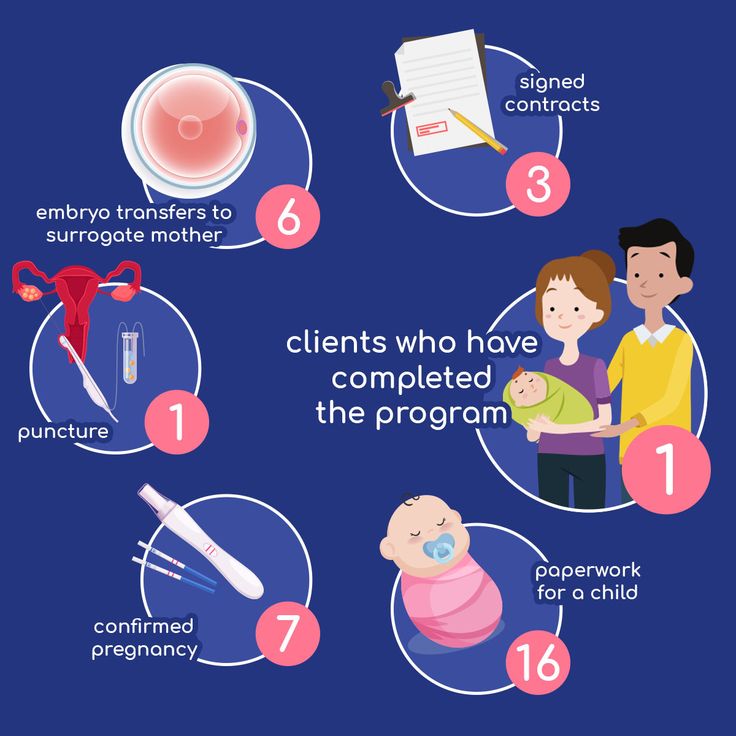 The surrogate then carries the baby and gives birth.
The surrogate then carries the baby and gives birth.
A gay couple might also choose an egg donor, fertilize that donated egg, and then have the embryo implanted in a gestational surrogate to carry until birth.
Finding a Surrogate
There are several ways you can find a surrogate mother:
Friends or family. Sometimes you can ask a friend or relative to be a surrogate for you. It's somewhat controversial. But because of the high cost of surrogacy and the complex legal issues it raises about parental rights, a tried-and-tested family relationship can be simpler to manage.
The American Society for Reproductive Medicine accepts certain family ties as acceptable for surrogates. It generally discourages surrogacy, though, if the child would carry the same genes as a child born of incest between close relatives.
A surrogacy agency. Most people use one to arrange a gestational surrogate. There are about 100 agencies now operating in the U.S. They act as go-betweens.
An agency helps you find a surrogate and make arrangements. It also collects any fees that get passed between you and the surrogate, such as paying for their medical expenses.
How to Choose a Surrogate
Right now there aren't any regulations about who can be a surrogate mother. But experts agree on a few points about how to select one.
You should choose surrogates who:
- Are at least 21 years old
- Have already given birth to at least one healthy baby so they understand firsthand the medical risks of pregnancy and childbirth and the emotional issues of bonding with a newborn
- Have passed a psychological screening by a mental health professional to uncover any issues with giving up the baby after birth
- Sign a contract about their role and responsibilities in the pregnancy, such as prenatal care and agreeing to give you the baby after birth
Using a Surrogate
The American Society for Reproductive Medicine says surrogates should get a medical exam to check that they are likely to have a healthy, full-term pregnancy. The organization suggests they get tests that check for infectious diseases such as syphilis, gonorrhea, chlamydia, HIV, cytomegalovirus, and hepatitis B and C.
The organization suggests they get tests that check for infectious diseases such as syphilis, gonorrhea, chlamydia, HIV, cytomegalovirus, and hepatitis B and C.
Surrogates should get tests to make sure they have immunity to measles, rubella (German measles), and chickenpox. Also, you may want to ask that they get a medical procedure to visually "map" the uterus, which can help the doctor check their potential to carry a pregnancy. Surrogate mothers should have their own doctor during pregnancy rather than use yours.
The cost of surrogacy can range from $80,000 to $120,000. A lot of different things go into the price, such as whether the surrogates have their own medical insurance or whether you need to buy a surrogacy-pregnancy policy for them.
Legal Issues With Surrogates
Parental rights aren't guaranteed after a surrogate pregnancy. The law continues to change as reproductive technology and the very definition of a "parent" changes.
There isn't a federal law on surrogacy and state laws vary. After a surrogate pregnancy in some states, you may still have to pass adoption proceedings to gain legal custody of the child. In other states, a "declaration of parentage" before birth lets you avoid having to "adopt" the baby.
After a surrogate pregnancy in some states, you may still have to pass adoption proceedings to gain legal custody of the child. In other states, a "declaration of parentage" before birth lets you avoid having to "adopt" the baby.
To protect your rights as parents-to-be -- and the rights of the child you're hoping to have -- hire an attorney who specializes in reproductive law in your state. They can write a surrogacy contract that clearly spells out what everyone needs to do.
A contract like that may help if legal issues come up after birth. It can also outline agreements about a variety of possible scenarios with the pregnancy, such as what happens if there are twins or triplets.
Infertility & Reproduction Guide
- Overview
- Symptoms
- Diagnosis & Tests
- Treatment & Care
- Support & Resources
Surrogacy
There are situations in which a woman cannot carry a child on her own. In such cases, married couples can resort to the method of surrogate motherhood, in which a surrogate mother bears a child that is genetically alien to her.
In such cases, married couples can resort to the method of surrogate motherhood, in which a surrogate mother bears a child that is genetically alien to her.
Surrogate motherhood refers to assisted reproductive technologies and involves the participation of three persons in the conception at once. Firstly, the genetic father takes part in the conception, who provided the sperm for fertilization and agreed to acknowledge his paternity after the child is born. Secondly, we are talking about a genetic mother who provided her egg for fertilization and agreed to play the role of mother after the birth of the child. Thirdly, the surrogate mother herself is involved in the procedure, which can be a woman of childbearing age who has agreed, as a rule, on a compensatory basis, to bear and then give birth to a child for genetic parents.
This method of treatment lies in the fact that the embryo is obtained from the egg and sperm of a married couple, but another woman, a surrogate mother, is responsible for carrying the child.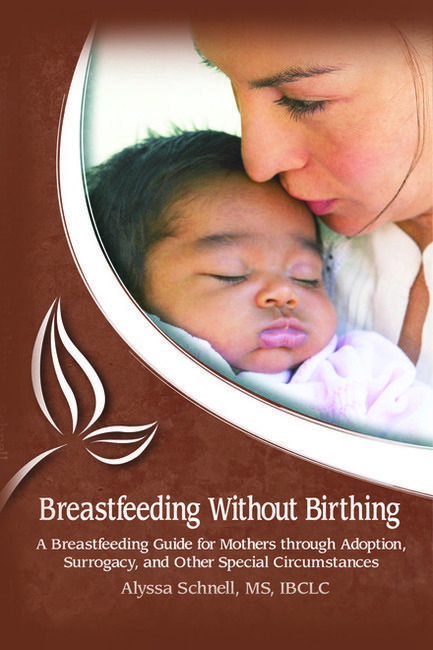 A surrogate mother does not have a genetic connection with the child she is carrying, and, therefore, is not able to transfer any of her traits to him, for example, the color of her skin, eyes, hair. The main requirement for a surrogate mother is expressed in physical health and a responsible attitude to the accepted role. Immediately after birth, the child is taken by the biological parents.
A surrogate mother does not have a genetic connection with the child she is carrying, and, therefore, is not able to transfer any of her traits to him, for example, the color of her skin, eyes, hair. The main requirement for a surrogate mother is expressed in physical health and a responsible attitude to the accepted role. Immediately after birth, the child is taken by the biological parents.
Who may need a surrogate mother?
In modern Russia, surrogacy is a method of treating pathologies associated with infertility. Surrogate motherhood is considered an extreme measure used in the treatment of severe forms of infertility. The help of a surrogate mother is addressed if the eggs of the biological mother can be fertilized, but the woman herself is not capable of bearing and giving birth to a child. The reasons may be related to an abnormality of the uterus or its complete absence, severe general diseases, the risk of rejection of transplanted donor organs, and the removal of malignant tumors.
Who can be a surrogate mother?
A familiar woman or an anonymous one can take the role of a surrogate mother. Mandatory conditions include the presence of at least one child of your own. In addition, the surrogate mother must be in good health, and her age cannot exceed 35 years. Another requirement is that a surrogate mother cannot bear a fetus that is derived from her egg.
THERE ARE CONTRAINDICATIONS. IT IS NECESSARY TO CONSULT WITH A SPECIALIST
The materials posted on this page are for informational purposes and are intended for educational purposes. Site visitors should not use them as medical advice. Determining the diagnosis and choosing a treatment method remains the exclusive prerogative of your doctor!
Surrogate motherhood: case studies.
Any risk has a degree of probability of occurrence, as well as non-occurrence.
The task of the participants in the process is to take all possible measures to reduce the likelihood of such events occurring.
Registration of documents in the registry office.
At the moment, the current legislation does not contain an exhaustive and clear list of requirements for the content and form of documents required for submission to the registry office.
After giving birth and signing all the necessary documents, the surrogate mother was preparing for discharge, and the genetic parents went to the registry office.
Employees of the district registry office informed about the need to provide a copy of the license of the clinic where IVF was done, as well as a special certificate.
Genetic parents were forced to look for an option to quickly obtain a certified copy of the clinic's license and resolve the issue with the execution of other documents.
The difficulty was that the IVF procedure was carried out in St. Petersburg, and the registry office in which it was supposed to perform registration actions in Moscow.
Registration of documents in the maternity hospital.

There was no lawyer in the maternity hospital who could provide qualified assistance in preparing the necessary documents.
As a result, the chief physician, fearing the possibility of being involved in a lawsuit, initially refused to certify the signature of the surrogate mother, and then demanded that the agreement between the genetic parents and the surrogate mother be provided, as well as other documents, some of which, in the opinion of the chief physician, should have been mandatory notarized.
The chief doctor's demands were outside the legal field and were justified solely by his inner convictions.
With the help of a lawyer, the genetic parents urgently filed a complaint with a higher supervisory authority, whose employees promptly responded to the appeal and explained in an accessible form to the chief doctor the specifics of his performance of his official duties.
Brother and sister were born 24 days apart.
After repeated unsuccessful attempts to treat infertility, it was decided to increase the likelihood of pregnancy by transferring (implanting) embryos to 2 surrogate mothers.
As a result, both surrogate mothers became pregnant, and one of them had a multiple pregnancy, which caused premature birth.
The doctors refused to induce premature labor or perform a caesarean section of the second surrogate mother to synchronize the date of birth of the children, because. there was no medical indication for this.
As a result, the difference in date of birth between two siblings and a sister was 24 days.
The registry office staff explained that they would be happy to help, but the Family Code of the Russian Federation does not provide for the possibility of changing the date of birth in order to preserve family and medical secrets for children born by a surrogate mother, in contrast to similar cases when children are adopted from an orphanage. Understanding that every time parents present birth certificates at work, in kindergarten, school or when traveling abroad, parents will be forced to answer questions that are not pleasant for them, and also fearing for possible psychological trauma for children, it was decided to apply to one from the district courts of Moscow.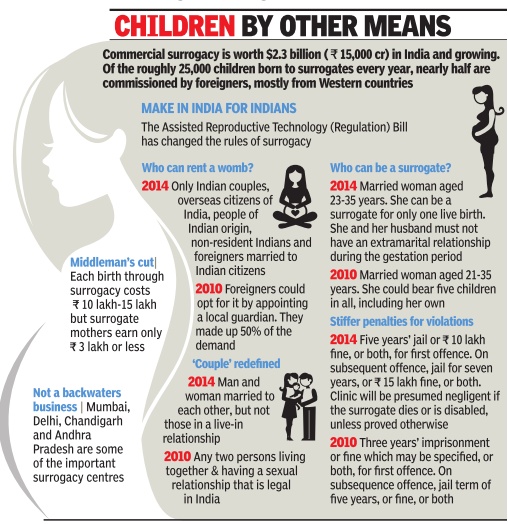
The court satisfied the demands of the parents and ordered the registry office to “synchronize” the dates of birth of the children.
A surrogate mother tried to sell HER child.
Crime reports are replete with reports of parents trying to sell their children, but this story is fundamentally different from the rest - the decision to “sell” the child was made before the onset of pregnancy!
Having entered the global Internet, the woman found an advertisement for a married couple looking for a surrogate mother.
The day before the embryo transfer procedure, the doctor saw on the ultrasound picture that the surrogate mother was already pregnant!
The surrogate mother did not invent fables and immediately told the truth - she was haunted by the idea that pregnancy might not occur as a result of embryo transfer and then she would not be able to earn money, but the idea came right away - guaranteed to get pregnant naturally, and a partner was found fast…
Confirming the full awareness of the committed actions, the “surrogate” mother said: "I understand that in fact I would give birth to my own child, and they (the married couple) would think that genetically this is their child . .. and I would still give it to them."
.. and I would still give it to them."
When asked that, in fact, she wanted to sell her own child, the already former surrogate mother answered with silence.
Surrogate mother's attempt to return children 2 years after birth..
2 years after the birth of the twins, the surrogate mother was very “upset” when she learned that the genetic parents were not married.
The surrogate mother formalized her “disorder” in the form of a statement of claim to challenge motherhood.
The fact is that the employees of the registry office, referring to the content of Part 4 of Art. 51 of the Family Code of the Russian Federation consider that a man and a woman must be married until the transfer of the embryo to a surrogate mother.
If a marriage certificate was issued after the embryo transfer or was not issued at all, genetic parents will definitely face serious difficulties in obtaining a birth certificate.
Of course, the very fact of the influence of marital status on the possibility of infertility treatment is a violation of the Constitutional rights of genetic parents who do not want or are not able to register a marriage.
This is confirmed by the content of Art. 35 of the Federal Law "On the protection of the health of citizens".
The court that considered the case denied the surrogate mother her claims and retained parental rights for genetic parents.
Contract with a surrogate mother.
One of the common causes of disputes and conflict situations between genetic parents and a surrogate mother is an agreement that does not meet special requirements.
In fact, the contract has clear signs of a contract for the provision of services.
At the same time, it must be remembered that the contract should not violate the rights and freedoms of a citizen and, of course, should contain mechanisms for resolving the most common situations in such processes.
Before starting preparations for the transfer of the surrogate mother's embryo, the genetic parents asked for a legal review of the contract drawn up by a lawyer working for a company headed by one of the genetic parents.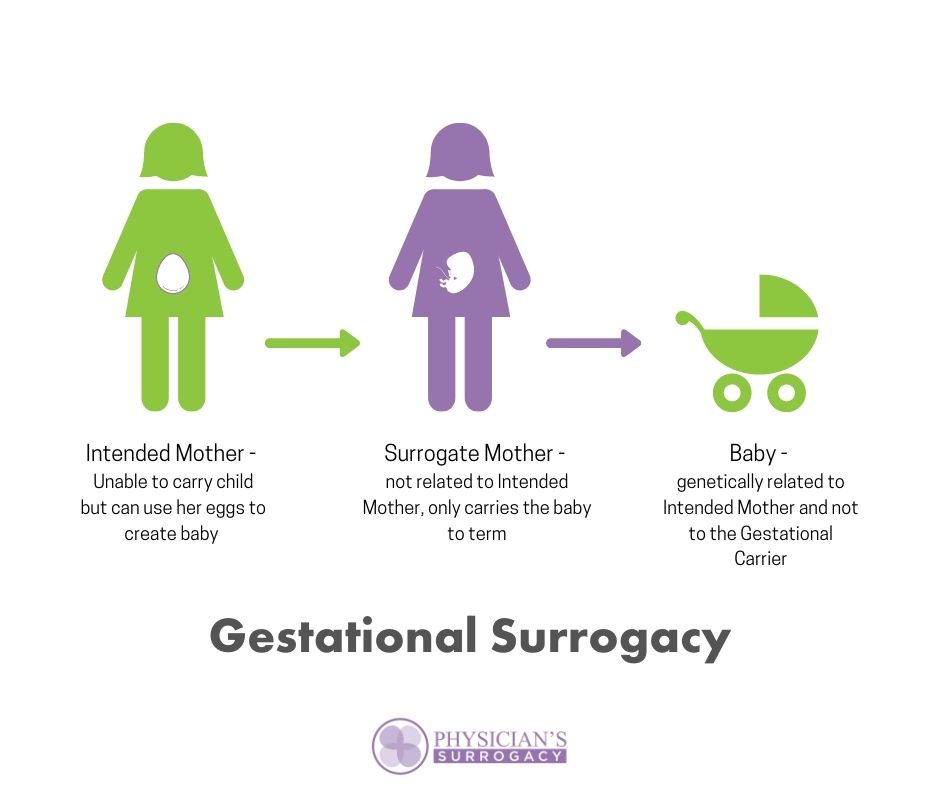
The subject of the agreement was the agreement of the parties that the genetic parents pay a fee to the surrogate mother for agreeing to record the genetic parents in the birth certificate as the father and mother of the child born by the surrogate mother. In fact, the genetic parents and the surrogate mother unintentionally signed a "heartfelt confession" to human trafficking.
Another contract, which fell into my hands, obliged the surrogate mother to sign an agreement to register the quote: "the rights of genetic parents to a child born by a surrogate mother."
Thus, the contract infringed on the inalienable right of the surrogate mother to independently decide on the issue of signing documents, and the child was considered as a thing subject to transfer by assignment of the right. Such conditions are not valid, with all the ensuing legal consequences.
Most of the contracts drawn up by lawyers who do not specialize in such matters, as well as contracts posted on the Internet, do not contain a number of essential conditions.